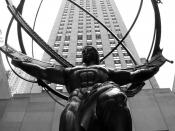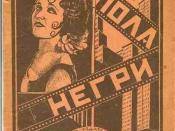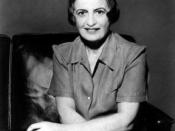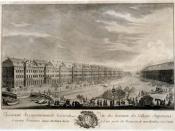In Ayn RandÃÂs, ÃÂAnthemÃÂ, Equality 7-2521, is a man living in the dark ages of the future. As stated on the back cover of RandÃÂs book, Equality 7-2521 lived ÃÂin an age that had lost all trace of science and civilization.ÃÂ Equality 7-2521 dared to go places like no other man of his time. He had the courage to think, seek, and love, which was forbidden in the collectivist society in which he lived. As explained in the introduction, ÃÂHe came close to losing his life because his knowledge was regarded as a treacherous blasphemyÃÂ (Rand). The world, Equality 7-2521 lived in was as one; a great ÃÂWE.ÃÂ But he knew that he was not a ÃÂweÃÂ, he knew he was something bigger and better. It was not until the end of the story when Equality 7-2521 found the last and holy word in a manuscript from the Unmentionable Times (which is supposedly our present day), ÃÂI.ÃÂ
The one word that changed his whole life. The one word that changed his perspective on all mankind. The one word that gave Equality 7-2521 an ÃÂego.ÃÂÃÂThe story of ÃÂAnthemÃÂ takes place in some unspecified future time and place in which freedom and individual rights have been obliteratedÃÂ (Bernstein). In ÃÂAnthemÃÂ, collectivism has overtaken individualism, which is one of the main themes in this story. Collectivism, which is, ÃÂthe political philosophy holding that an individual exists solely to serve the state, is dominant and has led to the establishment of a global dictatorship of the Fascist or Communist varietyÃÂ (Bernstein). As a reader begins to read ÃÂAnthemÃÂ, they realize the absence of the word ÃÂI.ÃÂ ÃÂThe characters refer to themselves using the first person plural ÃÂweÃÂ and not the first person singular ÃÂIÃÂÃÂ (Bernstein). The use of the plural rather than the use of the singular, goes to the center of the storyÃÂs meaning. The collectivist society Equality 7-2521 lives in, has banned the word ÃÂIÃÂ from all vocabulary. People are not to speak or even think this word. This collectivism makes a single individual not have a life of their own. But yet, they are a ÃÂfragment of a group whose sole purpose is to serve its needsÃÂ (Bernstein). Over the centuries of this collectivist society, theword ÃÂIÃÂ has vanished from everyoneÃÂs vocabulary. Only a mere memory exists in Equality 7-2521ÃÂs mind that there is an unspeakable word. Everyone in the community has tothink of themselves as ÃÂnameless, faceless, individuality-less chunks of an amorphous massÃÂ (Bernstein).
But one person found and used the unspeakable word ÃÂI.ÃÂ The Saint of the Pyre was his name, and he was condemned to death at the use of the word. Even though The Saint of the Pyre only appears in one of Equality 7-2521ÃÂs flashbacks, he is an important person in the story. Equality 7-2521 recalls him as having the ÃÂcalmest and happiest face,ÃÂ (Rand 61) as he prepares to be burned at the stake. ÃÂAs the flames engulf him, a strange thing happens. The SaintÃÂs eyes rove the crowd and stop on the youthful Equality 7-2521, singling him out for attention. The Saint stares at him with neither pain nor fear, but with a seemingly holy joy and with prideÃÂ (Bernstein). Equality 7-2521 believes the Saint is trying to communicate with him, that the Saint is trying to tell him the unspeakable word. This strange experience leaves Equality 7-2521 with the agonizing question, what is the unspeakable word? This question troubles him through the following years because of his deep thoughts of what word could possibly be missing from his life, and the curiosity of his mind and the want to learn more did not help much either. The character of The Saint provides an element of foreshadowing. The Saint recognizes Equality 7-2521ÃÂs features and compares them to his. He knows Equality 7-2521ÃÂs fate by his ÃÂheight, posture, and fearless gaze, the same independence of spirit that he possesses and singles himout as the next brave soul who will re-discover the word embodying the meaning of individualism. This scene symbolizes a passing of the torch from one man to anotherÃÂ (Bernstein). The Saint passes the want and desire to have the knowledge of the unspeakable word to Equality 7-2521.
As a young boy, Equality 7-2521 knew he was different than others, and after witnessing the death of The Saint of Pyre he knew he was something more than just ÃÂwe.ÃÂ Equality 7-2521 describes himself as, ÃÂWe are twenty-one years old. We are six feet tall, and this is a burden, for there are not many men who are six feet tall. We were born with a curse. It has always driven us to thoughts which are forbidden. It has always given us wishes which men may not wish. We know that we are evil, but there is no will in us and no power to resist it. This is our wonder and our secret fear, that we know and do not resistÃÂ (Rand 34). Even the teachers told Equality 7-2521, ÃÂThere is evil in your bones, Equality 7-2521, for your body has grown beyond the bodies of your brothersÃÂ (Rand 34). In the Home of the Students, Equality 7-2521 was not happy. Learning was too easy for him, and that was a sin in the mind of the teachers. It was not good to be different from your brothers, and it is evil to be superior to them. Equality 7-2521 was named to be a Street Sweeper when he finished school. Not the ideal job, but he was happy to do it for his brothers, even though he wished to be a Scholar. In the Home of the Street Sweepers Equality 7-2521 made friends with International 4-8818, though being friends was not allowed. The two found a hidden tunnel left from the Unmentionable Times, and this is where Equality 7-2521 wrote in his journal and learned things he should not have learned. Equality 7-2521 also discovered the joy a women could be in a manÃÂs life. For days he looked upon a woman working in the fields, Liberty 5-3000, not knowing what he was feeling. Finally Liberty 5-3000, now thought of as the Golden One in Equality 7-2521ÃÂs eyes, approached him and a special bond grew between them, a bond that frightened both of them. Additionally, in the tunnel Equality 7-2521 found, he managed to create electricity. He presented the electricity to the World Council, believing he had made the most outstanding discovery of his time, but was turned down and was going to be sentenced to death for his discovery. So he ran and ran until he could not run anymore, landing himself in the Uncharted Forest. Equality 7-2521 felt that he was nearing the end of his life, because no one survived in the forest. But then, The Golden One came and found him. The two new lovers walked through the forest day and night until they found a house that had been left from the Unmentionable Times. As they were walking into the house Equality 7-2521 ask The Golden One, ÃÂAre you afraid?ÃÂÃÂBut they shook their head. So we walked to the door, and we threw it open, and we stepped together into the house of the Unmentionable Times. We shall need the days andthe years ahead, to look, to learn, and to understand the things of this house. Today, wecould only look and try to believe the sight of our eyesÃÂ (Rand 92). In this house is where Equality 7-2521 found the manuscripts and discovered the unspeakable word ÃÂI.ÃÂ ÃÂI am. I think. I will. ÃÂMy hands . . . My spirit . . . My sky . . . My forest . . . This earth of mine. . . . What must I say besides? These are the words. This is the answerÃÂ (Rand 95). His life changed from that point forward, and he knew he still had much to learn. But, he realized that his new found knowledge of the unspeakable word was one small step for their future, and one giant leapfor the individuality and intelligence of the human race.
Finally, ÃÂAnthemÃÂ inspires all who read it. This world would be nothing without individuality. You would not have humor, the ability to speak your opinion, and the freedomof being whoever you want to be. People may never realize how important individualityis, until they read this book. It can truly change anyoneÃÂs perspective on the way they lookat their freedom of individuality. Equality 7-2521ÃÂs search for the unspeakable word was an amazing and courageous journey to embark on, and he proved that he was more than just a ÃÂwe.ÃÂHis newly discovered individuality provided Equality 7-2521 with a long anticipatedÃÂego.ÃÂWorks CitedBernstein, Andrew. CliffsNotes on Anthem. 25 Nov 2007http://www.cliffsnotes.com/WileyCDA/LitNote/id-17.html.
Rand, Ayn. Anthem. 1938.
Peikoff, Leonard. Introduction and Appendix to Anthem. 1995.





